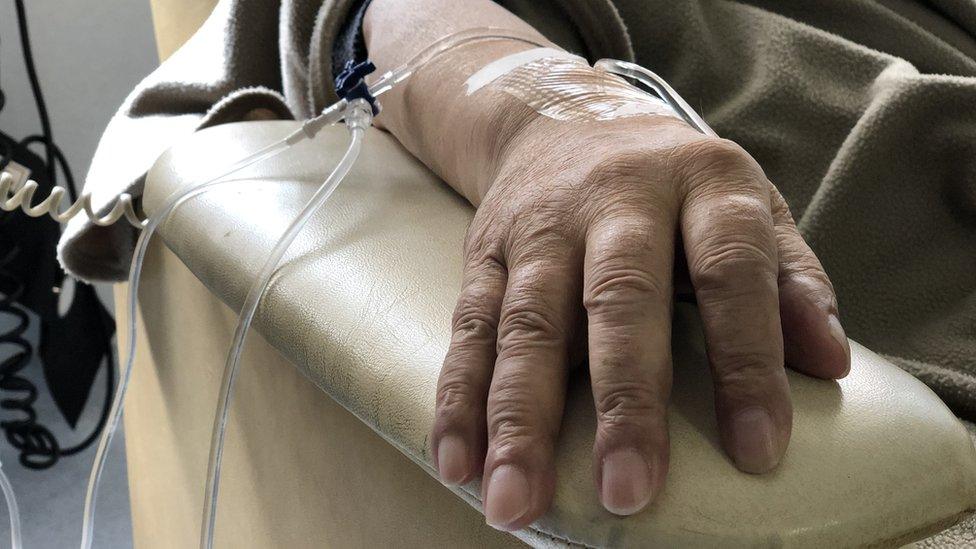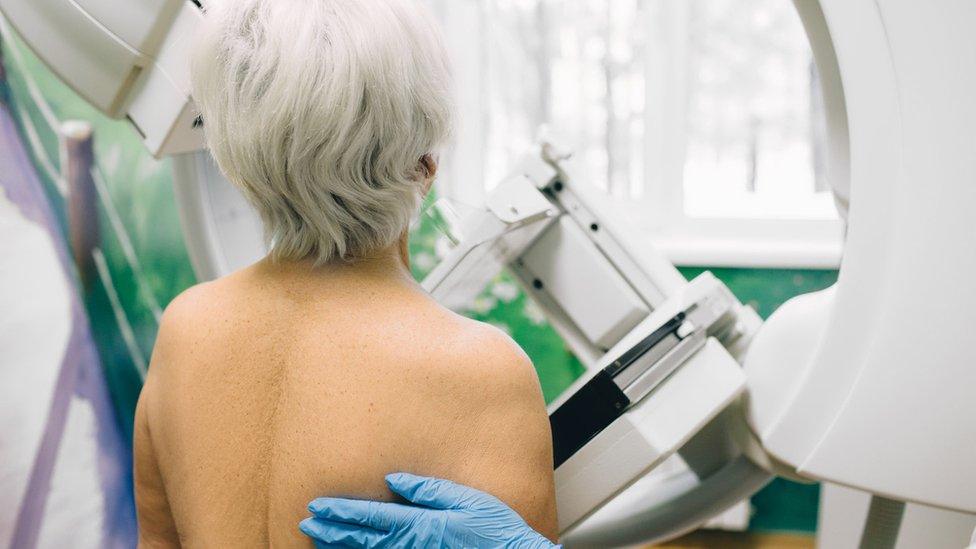Coronavirus: 'More than two million' waiting for cancer care in UK
- Published

There were fewer chemotherapy and radiotherapy treatments during the epidemic
About 2.4 million people in the UK are waiting for cancer screening, treatment or tests, as a result of disruption to the NHS during the past 10 weeks, according to Cancer Research UK.
It estimates 2.1 million have missed out on screening, while 290,000 people with suspected symptoms have not been referred for hospital tests.
More than 23,000 cancers could have gone undiagnosed during lockdown.
Cancer services are starting to reopen across the UK.
Cancer Research UK's figures are based on data for England and estimated for the whole of the UK.
Treatment cancelled
During lockdown, the health service focused on the care and treatment of patients with Covid-19, while other services, such as cancer care, were scaled back.
People were still encouraged to seek medical help when they needed it - but there were fewer cancer operations and many chemotherapy and radiotherapy appointments were postponed.
Screening programmes that detect early signs of bowel, breast and cervical cancer were paused in Wales, Scotland and Northern Ireland, although not officially stopped in England.
And an estimated 2.1 million people who would normally have had routine screening missed out, Cancer Research UK says.

Breast screening is just one of many ways of detecting cancers
The charity says urgent referrals, when patients with suspected cancer symptoms are referred to hospitals by their GP, fell by up to 75% in the first four weeks of lockdown, although these figures have since improved.
Patients receiving treatments for cancer also fell, with 6,000 fewer people receiving chemotherapy and 2,800 fewer receiving radiotherapy over the past 10 weeks.
And there were only 60% - 12,800 fewer - of the usual number of operations to remove tumours, Cancer Research UK estimates.
Chief executive Michelle Mitchell said Covid-19 has placed an "enormous strain on cancer services".
"The NHS has had to make very hard decisions to balance risk," she said.

RISK AT WORK: How exposed is your job?
SCHOOLS: When are children returning?
EXERCISE: What are the guidelines on getting out?
THE R NUMBER: What it means and why it matters
LOOK-UP TOOL: How many cases in your area?

"And there have been some difficult discussions with patients about their safety and ability to continue treatment during this time," she said.
"Prompt diagnosis and treatment remain crucial to give people with cancer the greatest chances of survival and prevent the pandemic taking even more lives."
To ensure no-one is put at risk from the virus now that cancer care is returning, Cancer Research UK said "frequent testing of NHS staff and patients, including those without symptoms" was vital.
'Lives turned upside down'
It estimates that up to 37,000 tests for the virus would need to be carried out each day for this purpose if the NHS was back running as normal.
This is happening at different speeds in the four nations of the UK, with the setting up of safe Covid-free spaces in hospitals key to addressing the backlog of patients.
NHS England said coronavirus "has turned millions of lives upside down" but cancer services were now largely "open, ready and able to receive all patients who need care".
Anyone concerned about cancer symptoms should contact their GP.
The Welsh and Scottish governments said cancer screening programmes would resume when safe, based on clinical advice.
In Northern Ireland, there are plans for urgent cancer surgery and treatment to resume, along with routine screening.
Macmillan Cancer Support recently warned of a potential "ticking cancer timebomb" due to disrupted cancer services. It said urgent action was needed to make sure cancer does not become the forgotten 'C' during the pandemic.
"We continue to urge the government to set out exactly how it will support the NHS to rapidly rebuild cancer services, including how people will be protected from infection by ensuring there is enough staff, regular testing, plentiful supplies of PPE and... social distancing," Sara Bainbridge, head of policy, said.

Have you or a loved one missed cancer screening, treatment or tests in the past 10 weeks? How has the lockdown affected your cancer treatment? Share your experiences by emailing haveyoursay@bbc.co.uk, external.
Please include a contact number if you are willing to speak to a BBC journalist.
WhatsApp: +44 7756 165803
Tweet: @BBC_HaveYourSay, external
Send pictures/video to yourpics@bbc.co.uk, external
Please read our terms & conditions and privacy policy